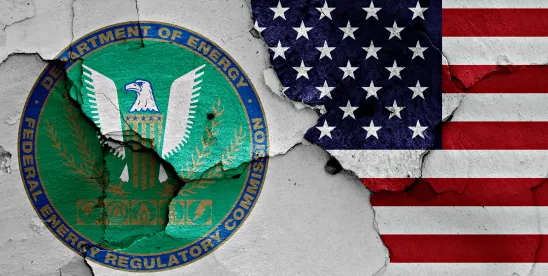On June 16, 2025, the Federal Energy Regulatory Commission (FERC) issued a Notice of Guidance regarding the consistency of its existing policies for referring alleged criminal regulatory offenses to the Department of Justice with President Trump’s Executive Order 14294, “Fighting Overcriminalization in Federal Regulations.”
FERC notes that, under the various statutes it administers, including the Federal Power Act, Natural Gas Act, and Natural Gas Policy Act, it is authorized to refer potential criminal conduct and provide evidence to DOJ, which has discretion to prosecute persons who knowingly and willfully violate FERC statutes, rules, regulations, or orders. FERC’s longstanding policy is to refer serious misconduct for criminal prosecution “to provide adequate punishment and deterrence,” and in doing so to “take all factors into account . . . , including the seriousness of the violation, the extent of the harm done, the evidence of willful behavior, and the strength of the evidence of wrongdoing.”
By May 9, 2026, consistent with EO 14294, FERC will provide the Office of Management and Budget with a report containing “(1) a list of criminal regulatory offenses enforceable by the Commission or DOJ; and (2) for each such criminal regulatory offense, the range of potential criminal penalties and the applicable mens rea [‘state of mind’] standard for a violation.”
The Notice also announces a “general policy, subject to appropriate exceptions and to the extent consistent with law,” that FERC and its staff should consider the following factors when determining whether to refer potential criminal violations to the DOJ:
(1) the harm or risk of harm, pecuniary or otherwise, caused by the alleged offense;
(2) the potential gain to the putative defendant that could result from the offense;
(3) whether the putative defendant held specialized knowledge, expertise, or was licensed in an industry related to the rule or regulation at issue; and
(4) evidence, if any is available, of the putative defendant’s general awareness of the unlawfulness of the conduct and knowledge or lack thereof of the regulation at issue.
These EO 14924 factors, FERC explains, overlap significantly with existing criminal referral factors outlined in its 2005 Policy Statement on Enforcement, which FERC will continue to follow.
Given that FERC already rarely exercises its criminal referral authority—having done so only twice in the past 15 years—the immediate effect of the Notice and policy tweak should be limited. However, to the extent that FERC’s enabling statutes contain any “strict liability” offenses where, as noted in EO 14294, a person “need not have a guilty mental state to be convicted of a crime,” this adjustment to FERC’s enforcement policy could spare market participants from criminal prosecution in certain cases, consistent with EO 14294’s purpose of “eas[ing] the regulatory burden on everyday Americans and ensur[ing] no American is transformed into a criminal for violating a regulation they have no reason to know exists.” The Foley team will continue to monitor developments in this area.
Special thanks to Abby Riggs, a summer associate in Foley’s Washington, D.C. office, for her contributions to this article.



 />i
/>i

